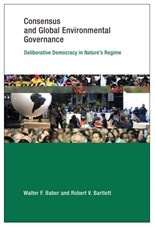Authors
Walter F. Baber & Robert V. Bartlett
Publication Year
2015
Source
The MIT Press
245 pages
Series
Earth System Governance
Series Editor: Frank Biermann, Oran R. Young
In this book, Walter Baber and Robert Bartlett explore the practical and conceptual implications of a new approach to international environmental governance. Their proposed approach, juristic democracy, emphasizes the role of the citizen rather than the nation-state as the source of legitimacy in international environmental law; it is rooted in local knowledge and grounded in democratic deliberation and consensus. The aim is to construct a global jurisprudence based on collective will formation. Building on concepts presented in their previous book, the award-winning Global Democracy and Sustainable Jurisprudence, Baber and Bartlett examine in detail the challenges that consensus poses for a system of juristic democracy.
Baber and Bartlett analyze the implications of deliberative consensus for rule-bounded behavior, for the accomplishment of basic governance tasks, and for diversity in a politically divided and culturally plural world. They assess social science findings about the potential of small-group citizen panels to contribute to rationalized consensus, drawing on the extensive research conducted on the use of juries in courts of law. Finally, they analyze the place of juristic democracy in a future “consensually federal” system for earth system governance.
| TABLE OF CONTENTS |
Series Foreword ix
Preface xi
Acknowledgments xvii
1. Nature Rules
2. Mapping and Developing Consensus for Global Environmental Governance
3. Legislation by Consensus: The Potential of International Law in Global Environmental Governance
4. Reconciling Diversity and Consensus in Democratic Governance
5. Environmental Justice and the Globalization of Obligation and Normative Consensus
6. The Citizen Jury as a Deliberative Forum: Juries as Instruments of Democracy
7. Slow – Motion Democracy: Synthetic and Progressive Development of the Structure of Rationalization
8. Deliberatively Democratic Administrative Discretion in Global Environmental Governance
9. Consensus, Consensual Federalism, and Juristic Democracy: A Governance System for Earth Systems
10. The Calculus of Consensus in Juristic Democracy: Between the Possible and Desirable
Appendix A: Using Specific Deliberative Judgments to Identify or Cultivate Global Norms with Christopher Dennis
Appendix B: The Countries of Eastern Terra: Geography, Politics, and People
Appendix C: Scenarios 1, 2, and 3
Notes
References
Index
About the author

Walter F. Baber
Professor in the Graduate Center for Public Policy and Administration at California State University, Long Beach. Baber and Bartlett are the coauthors of Deliberative Environmental Politics: Democracy and Ecological Rationality and Global Democracy and Sustainable Jurisprudence: Deliberative Environmental Law, both published by the MIT Press.

Robert V. Bartlett
Gund Professor of the Liberal Arts in the Department of Political Science at the University of Vermont. Baber and Bartlett are the coauthors of Deliberative Environmental Politics: Democracy and Ecological Rationality and Global Democracy and Sustainable Jurisprudence: Deliberative Environmental Law, both published by the MIT Press.


